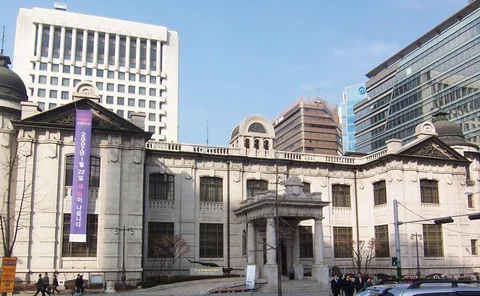Financial crisis
Higher interest rates would have hurt savers, says ECB's Cœuré
Executive board member says loose monetary policy does not stem from a desire to favour borrowers, but as a necessary response to bring the world economy back to growth and ultimately help savers
Bank of Albania governor highlights impact of euro crisis on non-EU members
Eastern European countries that are home to branches and subsidiaries of eurozone banks fell victim to lenders' lower risk tolerance and insufficient regulatory coordination, says Ardian Fullani
Crisis prompted both ‘re-discovery' and overhaul of CBs' emergency liquidity
Walter Bagehot's dictum to lend freely at high interest rates and against good collateral during a financial panic was revived, then altered during the crisis, according to Thomas Baxter of the NY Fed
Rosengren paper tackles role of banks in monetary transmission
Boston Fed president presents evidence on the effectiveness of the bank lending channel and provides observations about likely consequences of changes associated with the financial crisis
Near-zero interest rates of limited help to non-financial firms
BIS quarterly review article finds that lesser pass-through is partly related to higher premium for risk required by financial intermediaries
BoJ paper: ‘Sudden stop' central factor in recent financial crises
Guillermo Calvo argues 'sudden stops' help explain a number of issues which conventional monetary policy fails adequately to address
Slovenian economy assailed by austerity and money markets
According to central bank's 2012 annual report, inflation and credit costs increased as consumption, bank lending and the current account deficit fell
Customers of failing banks less likely to trust other people
DNB working paper says mistrust prompted by experience of crisis increases likelihood of bank runs and undermines long-term growth
Implicit government guarantees leads to increased risk-taking at banks
Fed discussion paper argues that strengthening market discipline by reducing bank complexity is needed to address moral hazard
Sovereign default spreads drove European bank risk exposures during crisis
Systemic risk of European banks reached its height in late 2011 at around €500 billion, based on a measure introduced in a recent Fed working paper
Lagarde tells central bankers not to 'rush to exit' on QE
Speaking at Jackson Hole, the head of the IMF said unconventional monetary policies were "still needed in all places it is being used" and that it was unclear what "exit" actually implied
Unemployment strongest predictor of mortgage default in the US
Atlanta Fed research finds that individual unemployment increases the probability of mortgage default by 5 to 13 percentage points compared with average sample
Swelling profits explain rebound in risk appetite, San Fran Fed paper suggests
Research indicates corporate profit growth explains 40% of the decline in the spread between risky and risk-free bonds, according to economic letter by research vice-president
Fed urges big banks to improve internal capital planning
Federal Reserve says lenders must strengthen methods for assessing risks; reveals 18 biggest US lenders face challenges in one or more areas
BIS paper weighs up early-warning indicators
Working paper examines which indicators are most effective at foreshadowing banking crises; uses a new statistical method based on particular policy requirements
Volcker rule in its ‘purest form' necessary to curb derivatives speculation
Under pressure from banks and hedge funds, the definition of ‘hedging' in the final Volcker rule could be so broad as to allow unchecked speculation dressed up as hedging, Vembar Ranganathan argues
Competition makes mutuals safer, commercial banks riskier
Bank of Korea research paper shows higher concentration in a less competitive loan market has increased default risks of mutual savings banks since the recent crisis
Central bankers should be wary of their political bargain with government
Central bankers appear ‘spellbound’ by governments keen to give them new regulatory powers despite concerns about their ability to deliver either stable monetary or financial policy in the future
ECB conflicted by Cyprus bail-in
The ECB’s failure to secure a bail-out for the Cypriot banking system changes the template for sovereign rescue in the eurozone. It also has implications for a central bank that appears conflicted
A status report on Dodd-Frank and the Volcker rule
As the US and Europe move closer to co-operating on derivatives legislation, Vembar Ranganathan looks at the status of Dodd-Frank implementation aimed at curbing excesses in the derivatives market
International banks pose risk to global financial system, NY Fed paper finds
Evidence from 2007 suggests banks can more easily deal with a credit crunch in their home jurisdiction than they can overseas, which could be a weak point in the global system, paper finds
‘Striking similarities' between eurozone and the pre-1914 gold standard
Both monetary arrangements provide underdeveloped peripheral countries with easy access to capital from the core countries, triggering asset price booms via the banking system in peripheral countries
Central Bank of Ireland director says it will take ‘some time' to get out of crisis
Fiona Muldoon adds the task now is putting together a business model for Ireland that ‘expands on parts of the economy not built on buying and selling houses to each other at ever inflated prices'




















